Character Development and Servant Leadership
Holistic Education
Heart, Habits, Head, and Hands
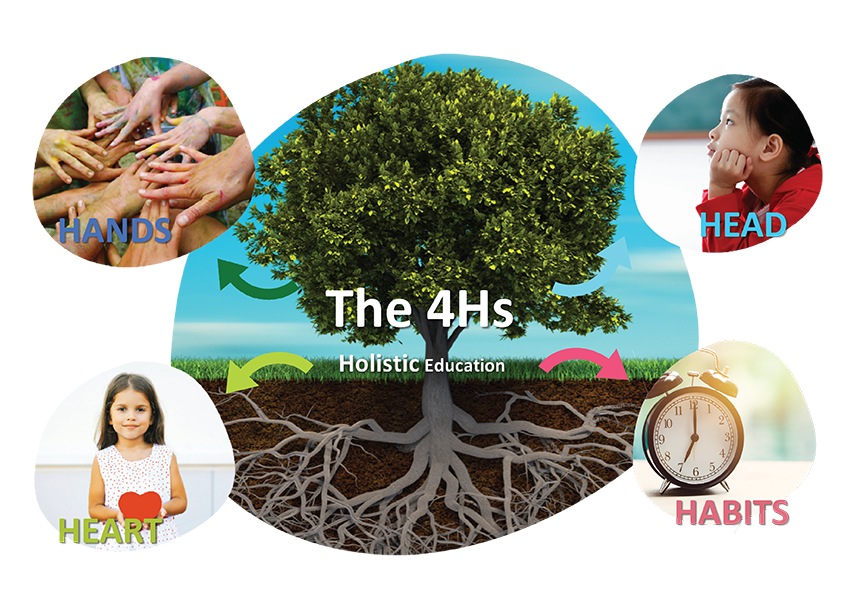
Holistic education at Christian Alliance P.C. Lau Memorial International School (CAPCL) can be elaborated with 4Hs. They are Heart, Habits, Head, and Hands. As illustrated by the school logo, which is a tree rooted in streams of water, our teaching and learning are grounded in "heart-work". It is written that "keep your heart with all vigilance, for from it flow the springs of life" (Proverb 4:23). How do our learners guard their heart from the distortion of pride and fear? It requires a humble heart. Humility allows us to have the right relationship with God, with self, and with others. A humble person has a healthy self-image, is teachable, and appreciates others' strength. Humility makes room for one to learn
from criticism, mistakes, and confrontation, as well as gives courage for one to take risks in overcoming uncertainty. Furthermore, CAPCL aims to support learners to develop healthy and godly habits. They are mighty learners and citizens who look after themselves and care for others.
Building on the solid foundation of "heart-work" with healthy and godly habits, learners are ready to learn and apply their learning. This is represented by the school logo – a tree which flourishes with green leaves and bears good fruits. CAPCL is intentional in integrating Biblical truth with the Alberta Bilingual curriculum. Learners have opportunities to apply what they learn (Head) into services (Hands) to one another within the school community and in our neighbourhood. As mighty learners and citizens, CAPCL learners are servant leaders and community leaders – to be an example in speech and behaviour, in love, faith, and purity. CAPCL believes that development of these four domains – heart, habits, head, and hands – bring forth quality holistic education.
Christian Education
Grow in God's Love
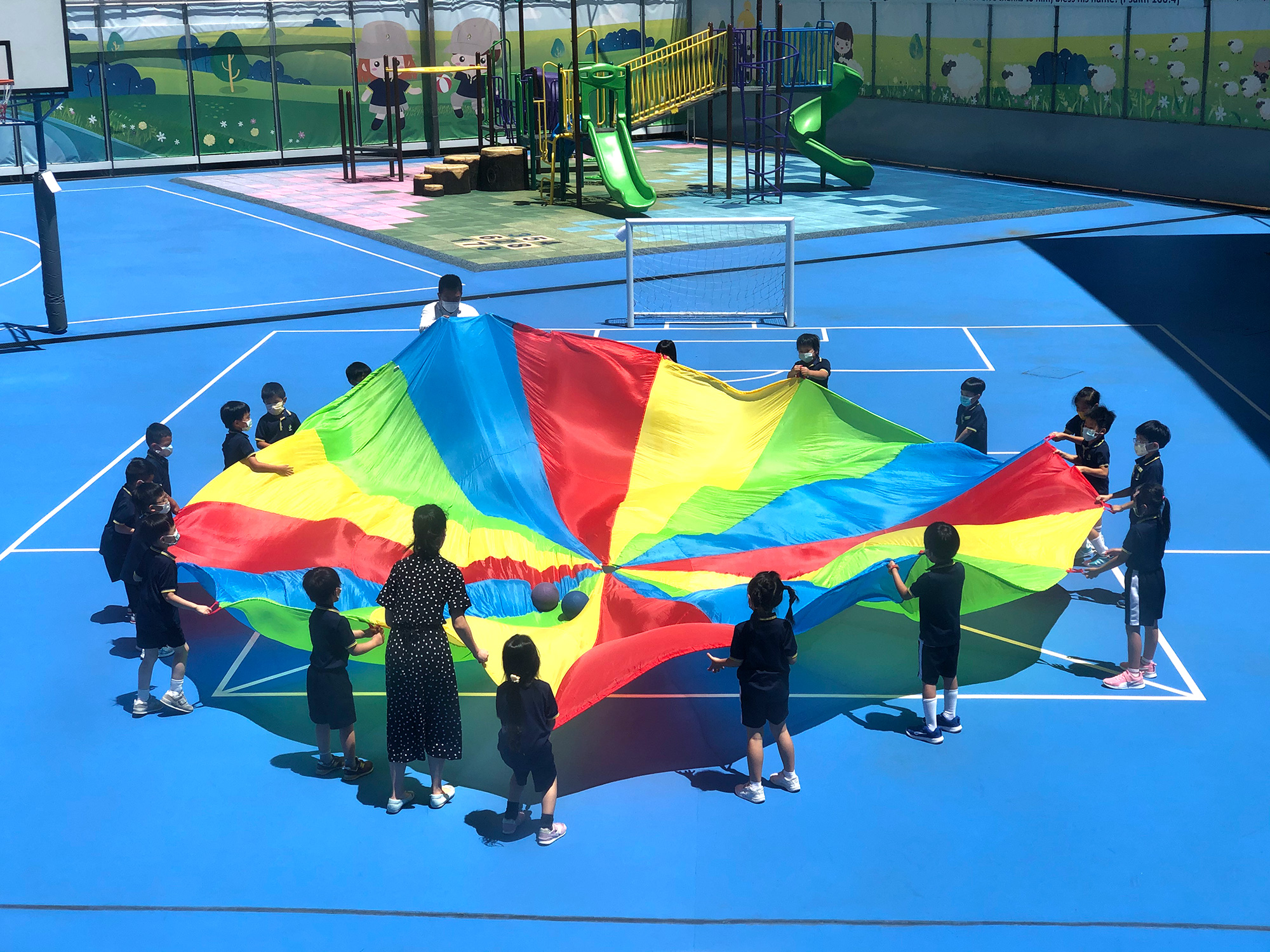
The philosophy of Christian education begins with the fundamental belief that every learner is special, unique and valuable. God has a plan and purpose for everyone, and everybody needs God. Therefore, Christian Alliance P.C. Lau Memorial International School (CAPCL) encourages each learner to develop his/her relationship with God the Father through Jesus Christ. The gospel is life transforming and prepares learners for a purposeful and fulfilling life. Christian education goes beyond dispensing information and imparting knowledge; Christian education highlights the importance of wisdom. Wisdom allows one to see self and his/her situation in a greater context, and then assign proper weight to things. Learners discern to do the right things, in the right way, at the right time and place, and most importantly, for the right reasons. Learners see and understand their world through the perspective of God's revealed truth.
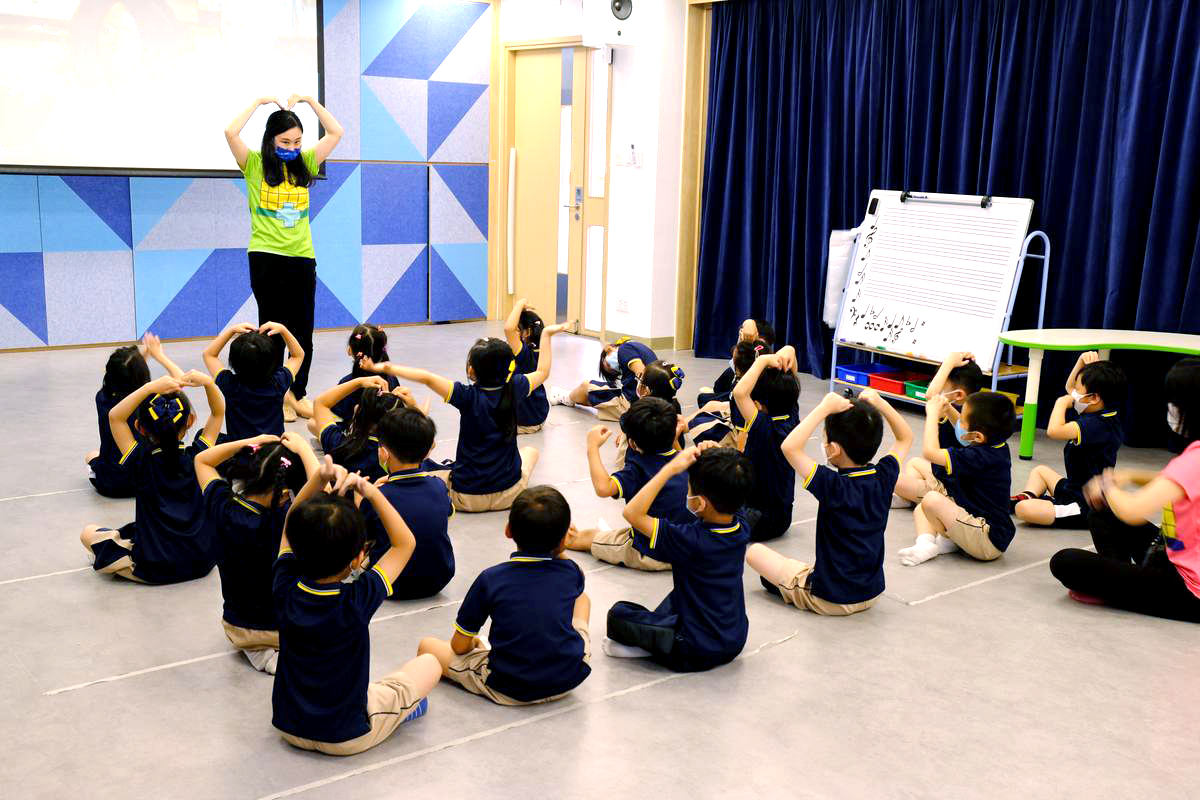
A unique distinction of Christian education is that parents have the ultimate responsibility to educate their children (Deuteronomy 6:7). Hence, the school takes the role of parents' partner in nurturing, developing and shaping godly character and spiritual values of these learners. Values that are taught at CAPCL are further reinforced at home so that learners can grow up with appropriate socialization skills to function in society. As a community, not only do CAPCL learners explore the Christian way of understanding, but also the Christian way of living. Characterized by love modelled by Christ, CAPCL is a caring, safe, respectful and welcoming community where members appreciate differences, celebrate diversity and use their gifts to serve one another. We are Christ's ambassadors and Christ-like servant leaders. The school is a Christ-centered, learner-focused, and others-oriented learning community. We look forward to partnering with you on this journey.
Relational, Relevant, and Rigorous Learning
"3R"'s Learning Environment
Learning through play helps our children see learning not as a chore but as an enjoyable activity that excites them. CAPCL understands that true interest can only be fostered when enjoyment is involved. CAPCL is a happy school because of our "3R"s—Relational, Relevant, and Rigorous—teaching and learning philosophy and practices.
"Relational" Teaching
CAPCL implements a co-homeroom system, two teachers are responsible for the care and education of students in each homeroom. Our co-homeroom teachers work together to provide a nurturing environment for students to explore and develop their strengths and talents. Our students are engaged in a network of support within a small classroom learning community. We are committed to unleashing every child's potential. Our teachers greet their children in front of the class doors every day. They pay close attention to how children interact with others. We offer suggestions when there is conflict, but let them work it out. We allow and encourage them to own their behaviour. We let our children know their ideas are helpful and appreciated. We focus on empowering them and acknowledging their strengths and achievements. Healthy, caring, and loving relationships with teachers and their peers create a safe, welcoming, happy learning environment.Teachers and staff work together to build a strong community of support for one another. We meet regularly in the morning for prayers and scripture readings. There are also community gatherings on Fridays after school dismissal to celebrate success, count blessings, and share our needs. In our Professional Learning Community, teachers and teaching assistants share highlights from their book study. We believe in TEAM—Together We Achieve More. Furthermore, team building and community service activities outside the school on Professional Development Days refresh our collective vision, mission, purposes and goals—to love God and serve one another. CAPCL desires that all stakeholders find meaning and pleasure in their home away from home—our School.
"Relevant" Lessons
Lesson planning from the perspective of children’s interests results in active participation and in-depth engagement. Children are encouraged to communicate their thoughts and contribute to class discussions in ways that are meaningful and impactful to their personal growth. Relevancy is crucial at CAPCL, and staff work to ensure that each lesson can be used outside of a classroom setting to help enrich your child's overall development. There are also various co-curricular events and extracurricular activities, as well as sports teams. Students have the opportunity to pursue their individual passions and interests or challenge themselves with something new. They may select from a wide range of activities such as dance, drama, choir, badminton, basketball, football, table tennis, swimming, STEM, and many more.
"Rigorous" Curriculum
CAPCL adopts a bilingual program under Canada's Alberta education system. The instruction medium is approximately 65% English and 35% Chinese (Mandarin with the traditional script). Not only is language learning useful in preparing students for their future, but it is also mentally stimulating, which in turn supports a growth mindset development. Students studying in a bilingual environment are better at divergent thinking tasks. Bilingual education can improve children’s memory ability and attention span. Therefore, bilingual education benefits students in multiple ways. Our School community promotes the values of positivity. Having a Growth Mindset is our school theme this year. Growth mindsets in education align with brain plasticity, the concept that our thoughts and actions can improve our brain functioning. We encourage our students to learn from their mistakes and seek out challenging experiences. Through this process, children learn to embrace themselves and focus on their strengths. Whilst CAPCL reinforces a play-oriented approach in the classroom, teachers also ensure that our children thrive with the knowledge within the environment of their learning and beyond.
Praise and Worship
Flourish in God's Grace

Christian Alliance P.C. Lau Memorial International School (CAPCL) strives to be a Christ-centered, learner-focused, and others-oriented community. Our chapel service consists of children leading in worship singing and scripture reading, followed by a short Bible message. Parents are welcome to join our monthly worship gathering. We encourage children to memorize Bible verses and develop Godly wisdom. The book of Hebrews provides the blueprint to build such a community with God's blessings and promises.
In our attitude toward God,- Let us revere the Holy God (4:1)
- Let us draw near to God with a sincere heart (10: 22)
- Let us approach the throne of grace with confidence (4:16)
- Let us be thankful (12:28)
- Let us offer to God a sacrifice of praise (13:15)
In everything that we do,- Let us be diligent (4:12)
In our relationship with one another,- Let us spur one another on toward love and good deeds (10:24)
- Let us encourage one another (10:25)
Along the spiritual journey,- Let us press on to maturity (6:1)
- Let us run with perseverance (12:2)
As witnesses to the outsiders,- Let us hold firmly to the faith we profess (4:14)
- Let us hold to the hope we profess (10:23)
The apostle Paul does not tell us to be like the body of Christ, but that "you are the body of Christ, and each one of you is a part of it" (1 Corinthians 12:27). The apostle Peter echoes Paul's teaching that "you are a chosen people, a royal priesthood, a holy nation, God's special possession" (1 Peter 2:9a). It is instructive that Peter does not refer to a chosen person, a single priest, or an individual citizen. To follow Jesus is to be part of a community. Hence, let us roll up our sleeves, join hands, and build our community as a place where members are able to make use of their gifts and feel validated about their abilities; as a place where members respect, appreciate, and celebrate their differences; as a place where members are delighted to use their talents to serve one another; and as a place where members treasure their sense of belonging, grow and support one another.
- Let us revere the Holy God (4:1)
- Let us draw near to God with a sincere heart (10: 22)
- Let us approach the throne of grace with confidence (4:16)
- Let us be thankful (12:28)
- Let us offer to God a sacrifice of praise (13:15)
- Let us be diligent (4:12)
- Let us spur one another on toward love and good deeds (10:24)
- Let us encourage one another (10:25)
- Let us press on to maturity (6:1)
- Let us run with perseverance (12:2)
- Let us hold firmly to the faith we profess (4:14)
- Let us hold to the hope we profess (10:23)
Serve Like Jesus
Not So With You (Mark 10:43)
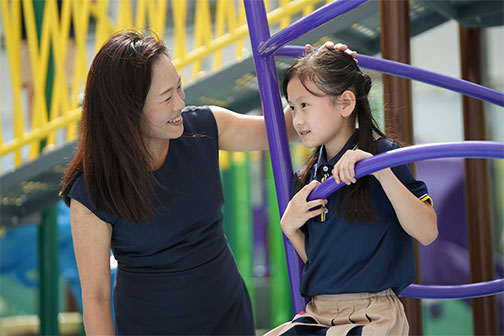
Children at Christian Alliance P.C. Lau Memorial International School (CAPCL) serve each other and reach out to others in our community. They are fond of Community Time when upper primary children work with lower primary children and help them to complete different missions. Students may also volunteer to serve at their Treehouse Library. They are always prepared to share their love with others, such as hand-knitting scarves as gifts for others, distributing festive gifts at the elderly center, carolling, beach-cleaning, and more…As a Christ-centered, learner-focused, and others-oriented community, we strive to serve like Jesus.
The term servant leadership was first coined by Greenleaf (1970) in his seminal essay, The Servant as Leader. The servant-leader is servant first... It begins with the natural feeling that one wants to serve, to serve first. Then conscious choice brings one to aspire to lead... The difference manifests itself in the care taken by the servant-first to make sure that other people's highest priority needs are being served. The best test is: do those served grow as persons; do they, while being served, become healthier, wiser, more autonomous, more likely themselves to become servants? And what is the effect on the least privileged in society; will they benefit, or at least, not be further deprived? (p.13) The desire to be servant-first cannot be imposed but is a personal choice for life. The motive is to help others. A servant-leader is interested in developing others. A servant-leader has emergent power and uses such power to serve. As a result, everyone goes further into realization of his/her potential, reaching closer into finding the significant meaning of life, and living a fulfilled life by serving others. Servant-leadership is exemplified in Jesus Christ, in the fusion of transcendence and humility. Jesus, as presented in the Holy Bible, is the Son of God. However, he is described as the 'holy servant Jesus' (Acts 4:27). He humbled himself and was born in a manger (Luke 2:1-7). He lived an earthly life. He was personable and his actions were fueled by love. He taught his disciples, preached to the masses, healed the sick, and befriended the outcasts of the society. He even washed his disciples' feet after a long day of work. The Son of God made His dwelling among mankind (John 1:14). This implies a blend of transcendence and immanence. It states that "even as the Son of Man came not to be served but to serve, and to give his life as a ransom for many" (Matthew 20:28).
The Parable of the Good Samaritan is a practical outworking of the servant-hood aspect of servant-leadership principles. It illustrates how one should love God and serve others, the greatest commandment in Christianity (Matthew 22:34-40). A servant-leader is one who chooses to be available and extends a helpful hand to those who are marginalized and in need of help. Servant-leadership is not about position, power, or prestige but willingness to look out for the interests of others above self-interest (Philippians 2: 3-4).

Christlike Leaders
Student Leadership Development Program

Dr. Cora Hui, Head of School, is an educational researcher. She argues that servant leadership cultivates grit and a growth mindset in learners (2016), supports wellness development of youngsters (2018, 2022), and equips children to make better and more caring decisions (2023). Teachers, as servant-leaders, meet learners' social, cognitive and motivational needs of students (2017). When the cumulated works of a servant leader fit together into a unified optimal experience, they find fulfillment and live a meaningful life (2021). We are living in the age of information. It is no longer the holders of information, but the critical thinkers and analysts that meet the demand of this era.
Furthermore, it is beyond acquisition of knowledge and skills, but in conjunction with integrity and discernment, that build prosperous and sustainable future. Hence, the purpose of education can be to liberate learners' potential so that they "become healthier, wiser, freer, more autonomous, more likely themselves to become servant" (Greenleaf, 1970, p.13). The purpose of education can be to develop the next generation of servant-leaders, who have a strong sense of morality, and who are committed to ethical practices in building a service-oriented community. This implies that learning in the classroom is more than a series of performance goals, and declarative and procedural knowledge. Learning should aim for responsive and responsible autonomy. Christian Alliance P.C. Lau Memorial International School (CAPCL) focuses on student leadership training. Children learn to serve like Jesus and become servant leaders who are joyful and helpful, confident and competent, responsible and self-motivated. They are proud to be CAPCL Christ Ambassadors.
Reference:Greenleaf, R.K. (1970). The servant as leader. Indianapolis, IN: Robert K. Greenleaf Center.Chan, K.W. C. (2016). Servant leadership cultivates grit and growth mindset in learners. Servant Leadership: Theory & Practice, 3(2), 12-22 https://csuepress.columbusstate.edu/sltp/vol3/iss2/2/Chan, K.W.C. (2017). Learners' perceptions of servant-leadership. International Journal of Servant-Leadership, 11. https://www.gonzaga.edu/-/media/Website/Documents/Academics/School-of-Leadership-Studies/DPLS/IJSL/Vol-11/IJSL-Vol-11-15-Chan.ashx?Chan, K.W.C. (2018). Servant leadership supports wellness development in adolescents. Servant Leadership: Theory & Practice, 5(2), 41-52. https://csuepress.columbusstate.edu/sltp/vol5/iss2/3/Chan, K. W. C (2021). Servant Leadership, Optimal Experience, and Meaningful Life. Servant Leadership: Theory & Practice, 8(1), Article 4. https://csuepress.columbusstate.edu/sltp/vol8/iss1/4Chan, K. W. C (2022). Serving our Children During and After COVID-19: Application of Shepherd Leadership at Home and School. Servant Leadership: Theory & Practice, 9(1), Article 3. https://csuepress.columbusstate.edu/sltp/vol9/iss1/3/Chan, K. W. C (2023). The Relevance and Benefits of Moral Intelligence to Servant Leadership, Servant Leadership: Theory & Practice: Vol. 10: Iss. 1, Article 3. https://csuepress.columbusstate.edu/sltp/vol10/iss1/3
Characteristics of Christlike Leaders
Christian Alliance P.C. Lau Memorial International School (CAPCL) emphasizes on servant leadership development in learners. The ten characteristics of CAPCL servant leaders are:

Listening
Listening is an attitude and commitment towards understanding self and others. The Chinese character "listening" shows that active listening requires us to listen with our ears, eyes, and heart.

Empathy
The development of empathy stretches one to step outside of self, to focus on others and their context. It broadens CAPCL learners' perspectives.

Healing
A servant leader extends helpful hands to those who are in need.

Mindfulness
CAPCL learners are encouraged to develop habits of quietness and reflection, as well as evaluate situations from complementary and contradictory perspectives.

Persuasion
CAPCL learners convince, instead of coerce, others to reach a consensus within teams. They are assertive but not aggressive in their interactions with others.

Conceptualization
CAPCL learners are guided by their teachers to develop conceptual thinking and thorough planning strategies.

Foresight
CAPCL learners evaluate the lessons from the past, the realities of the present, and the likely consequences of a decision for the future.

Stewardship
CAPCL learners make good use of their resources and time to serve others.

Growth Mindset
CAPCL teachers model and instill a growth mindset in students.

Building Community
Individuals find their sense of belonging and identity, and they give and receive support from one another within the CAPCL community.
Who We Are in Christ
Identity-based habit formation
At Christian Alliance P.C. Lau Memorial International School (CAPCL), we expose God's truth through our curriculum. In doing so, we find out who we are in Christ and whom we serve. We are:
God Worshippers
who understand that worshiping God is about celebrating who God is, what God has done and is doing, and what God has created.
Earth Keepers
who respond to God's call to be stewards of all creation.
Beauty Creators
who create beauty that praises God and enriches our world.
Creation Enjoyers
who celebrate God's beautiful handiwork and give testimony to the presence of God in creation
Servant Workers
who work actively to heal brokenness and bring joy to individuals and to culture.
Community Builders
who are active pursuers and builders of community in our classrooms, in our neighbourhoods, and in the global village.
Image Reflectors
who bear the image of God in our daily lives. Being an image bearer isn't something we DO. An image bearer is who we ARE.
Order Discoverers
who see God’s masterful planning and His fingerprints all over creation.
Justice Seekers
who act as agents of restoration.
Idolatry Discerners
who learn to "read" a worldview by asking questions about what is being portrayed in regard to culture, values, and belief systems.
Reference:The Prairie Centre for Christian Education (2018) Teaching for Transformation. https://www.pcce.ca/Teaching-for-Transformation
Play, Participate, Possibilities
Values for our Learning Process
At Christian Alliance P.C. Lau Memorial International School (CAPCL), children's dispositions are revealed to us in their play, learning, and daily experiences. The following five dispositions to learn reflect the image of a capable, strong, and resourceful child who is an agentic and active learner – a mighty learner and citizen. The combination of “I/We” is used intentionally to remind us that care, play, and learning are always both individually and socially constructed.

1. I/We are playing and playful:- I/We are inventing, creating, and imagining.
- I/We are creating and testing theories.
- I/We are telling and directing narratives and stories.
- I/We are exploring and representing our knowledge using multimodal literacies.
- I/We are taking risks in/for learning.

2. I/We are seeking:- I/We are questioning.
- I/We are exploring with all our senses.
- I/We are wondering and are curious.
- I/We are solving problems in our play and learning.

3. I/We are participating:- I/We are engaging with others.
- I/We are listening to and sharing ideas, thoughts, and feelings.
- I/We are negotiating, taking turns, and observing.
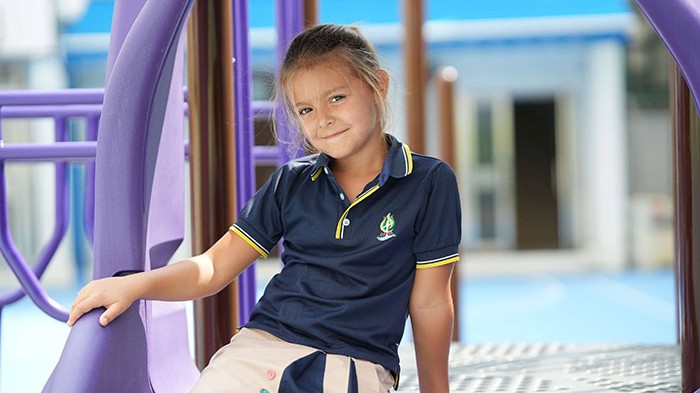
4. I/We are persisting:- I/We are persevering with challenges and/or difficulties.
- I/We are trying new strategies.
- I/We are asking for help.
- I/We are striving to reach our own goals.

